|
|
|
Sort Order |
|
|
|
Items / Page
|
|
|
|
|
|
|
| Srl | Item |
| 1 |
ID:
050047
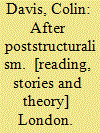

|
|
|
|
|
| Publication |
London, Routledge, 2004.
|
| Description |
210p.Pbk
|
| Standard Number |
041531609X
|
|
|
|
|
|
|
|
|
|
|
|
Copies: C:1/I:0,R:0,Q:0
Circulation
| Accession# | Call# | Current Location | Status | Policy | Location |
| 047455 | 801.95/DAV 047455 | Main | On Shelf | General | |
|
|
|
|
| 2 |
ID:
091714
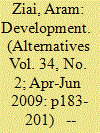

|
|
|
|
|
| Publication |
2009.
|
| Summary/Abstract |
The postdevelopment school has criticized development projects for their inherent power relations and their authoritarian implications. However, since the 1980s a transformation in development discourse can be observed that includes an emphasis on participation and civil society organizations. Through the analysis of several development projects, the article pursues the question of whether this transformation can also be observed on the level of projects-and on the level of inherent power relations. From a poststructuralist perspective, it argues that "development" functions as an empty signifier that can be filled with almost any content but constrains its form.
|
|
|
|
|
|
|
|
|
|
|
|
|
|
|
|
| 3 |
ID:
171785
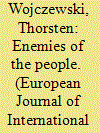

|
|
|
|
|
| Summary/Abstract |
Populists are on the rise across the globe and claim to speak on behalf of ‘the people’ that are set against the establishment in the name of popular sovereignty. This article examines how populist discourses represent ‘the people’ as a referent object that is threatened and the form and implications of this populist securitisation process. Drawing on securitisation theory and poststructuralism, the article understands populist securitisation as a discursive practice that propagates a politics of fear, urgency, and exceptionality in order to mobilise ‘the people’ against a ‘dangerous’ elite and normalise this antagonistic divide of the social space. While the proposed theoretical framework aims to clarify the relationship between poststructuralist and securitisation theory and capture the nexus between populism and security, the case of populism broadens the scope of potential subjects of security and poses important challenges to existing theoretical assumptions about security as something designated by states’ representatives and ‘security experts’. The article develops and illustrates its arguments with a case study on the (de)securitisation moves in the populist discourse of Donald Trump.
|
|
|
|
|
|
|
|
|
|
|
|
|
|
|
|
| 4 |
ID:
078891
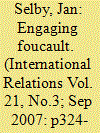

|
|
|
|
|
| Publication |
2007.
|
| Summary/Abstract |
This article provides a critical survey of the appropriation of the work of Michel Foucault within poststructuralist IR. Foucault has thus far been employed within poststructuralist IR in three ways: to support deconstructions of realist international theory; to analyse modern discourses and practices of international politics; and to develop novel accounts of the contemporary global liberal order. I argue that the first and the third of these usages are especially problematic. Utilised for the critique of realism, Foucault's main emphases have consistently been overlooked or misrepresented. By contrast, when `scaled up' to inform analyses of world order, Foucault's work has ended up supporting essentially liberal accounts of international politics. There are, I argue, clear limits to the use of Foucault in theorising international and world politics, and given this I conclude that if Foucault is to be used more effectively within IR, his work needs to be situated within a framework - I suggest a Marxist one - which is cognisant both of the structural dimensions of power, and of the specificity and irreducibility of the international
|
|
|
|
|
|
|
|
|
|
|
|
|
|
|
|
| 5 |
ID:
117031


|
|
|
|
|
| Publication |
2012.
|
| Summary/Abstract |
In a 2008 International Politics article, David Patrick Houghton questions the importance of 'The Third Debate' in IR theory between 'positivism and postmodernism' and the relative worth of contrasting epistemological positions. Houghton's main argument is that the philosophical underpinnings of IR have not been central to what IR scholars actually do; specifically, the epistemological differences between positivists and postmodernists have little practical effect upon their empirical findings. In short, epistemology does not matter. This article analyses Houghton's thesis within the context of a dominant discourse in the discipline that derides postpositivism and, by corollary, rejects methodological pluralism incorporating both positivist and postpositivist approaches, what I refer to as 'epistemethodological pluralism'. This article questions the main assumptions underpinning this discourse by deconstructing the definition of 'postpositivism' that underpins the 'naysayer' arguments deriding or dismissing epistemological differences between positivism and postpositivism. Using examples of positivist and postpositivist research that focus on the foreign policy of the United States, European Union integration and Middle East politics, the article demonstrates how epistemological issues have a significant impact on empirical research in International Relations and illustrates the benefits of integrating the different epistemological approaches.
|
|
|
|
|
|
|
|
|
|
|
|
|
|
|
|
| 6 |
ID:
126797
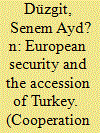

|
|
|
|
|
| Publication |
2013.
|
| Summary/Abstract |
Following a poststructuralist theorising of identity in international relations, which argues that identity is relationally and discursively constructed through foreign policy, this article attempts to analyse the way in which the European Commission discursively constructs European identit(ies) in its relations with Turkey around the theme of 'security'. The study utilises the methodological tools of critical discourse analysis in analysing the speeches and field interviews conducted with European Commission officials, in examining the way in which they construct 'Europe' in relation to the security implications of Turkish accession. The article's findings challenge the argument that Europe is moving beyond the modern state to resemble a postmodern order, and problematises the designation of the Commission as a 'cosmopolitan' actor in EU enlargement policy.
|
|
|
|
|
|
|
|
|
|
|
|
|
|
|
|
| 7 |
ID:
153242


|
|
|
|
|
| Summary/Abstract |
The aim of this article is to interpret Tokyo's pivotal role in the Kyoto Protocol negotiations as a practice of reconstructing Japan's identity of an ‘international’ and ‘independent’ country. The text bases this argument in poststructural national identity scholarship, which believes that discursive differentiation to international forces (‘others’) plays a decisive role in formulating state's identity. For most parts of the post-war history, United States served as the most significant other for Japan's self construction. Japan narrated itself as a ‘weak’ and ‘subservient’ country dominated by the ‘dominant’ West. This narrative, however, has been significantly altered after the dissolution of the Soviet Union. Japan's identity entrepreneurs began describing Japan as an ‘independent’ or ‘normal’ country, one that proactively contributes to world affairs. Tokyo's legitimization of the Kyoto Protocol was in line with this identity reconstruction. The image of a proactive environmental leader created a symbol of Kyoto that overshadowed the opponents of the Protocol, and lead Japan to ratify it albeit the United States chose to withdraw from it. Once the ratification was over, however, the practical implementation failed to comply with Japan's symbolic commitment.
|
|
|
|
|
|
|
|
|
|
|
|
|
|
|
|
| 8 |
ID:
192319
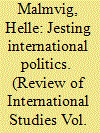

|
|
|
|
|
| Summary/Abstract |
Humour has recently emerged as an important research topic in International Politics. Scholars have investigated how states and state leaders practice humour as part of their diplomatic exchanges, in misinformation campaigns, and nation-branding. Important knowledge has been gained as to how humorous practices partake in constituting identities, managing recognition, and international anxieties or contesting global orders. Yet, little attention has been devoted to interrogating the risk that humorous practices may give rise to in international politics, to the underside of humour's productive power. This article aims to begin unpacking these risks both theoretically and empirically. To do so, it engages with the critical thinking on humour by Kierkegaard and Foster Wallace in particular, suggesting three challenging implications: (1) humorous entrapments; (2) facile forms of detached engagement; and (3) ambiguous blurring of fiction and reality. It then shows how these unfold empirically in: Iran's meme war with the US, a Yes Men's parody during COP15, and the Pyongyang Nuclear Summit, developing a three-pronged analytical strategy for studying humorous practices and their different relations to formations of power/knowledge.
|
|
|
|
|
|
|
|
|
|
|
|
|
|
|
|
| 9 |
ID:
174705
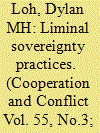

|
|
|
|
|
| Summary/Abstract |
Sovereignty is the core concept of international relations. Almost without exception, approaches to sovereignty in IR have followed a binary framing where sovereignty is seen to consist of two components: ‘internal’ versus ‘external’ sovereignty, ‘positive’ versus ‘negative’ sovereignty, and so on. These dichotomies stem from the prevailing understanding of sovereignty as the boundary between the inside and the outside of the state. This article builds on and expands these existing approaches by reconceptualizing the sovereign border line as a liminal border space. Relatedly, we theorize the concept of liminality in greater depth by distinguishing between four distinct kinds of liminality: marginal, hybrid, interstitial, and external. Each of these problematizes the dividing line of sovereignty in unique but comparable ways. We empirically illustrate these four kinds of liminality with reference to contested states, ‘tribal’ or ‘indigenous’ groups, NGOs such as Amnesty International, and extremist groups such as ISIS, respectively. Each of these types of liminality entails unique actors, practices, and consequences for the concept of sovereignty. We suggest that liminal sovereignty practices represent the most radical source of change for the concept of sovereignty, yet at the same time, somewhat counterintuitively, they also serve as the best means of clarifying existing, established meanings and practices of sovereignty.
|
|
|
|
|
|
|
|
|
|
|
|
|
|
|
|
| 10 |
ID:
160883
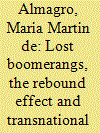

|
|
|
|
|
| Summary/Abstract |
This article aims to show the added value of studying transnational advocacy networks through a discursive approach in order to better understand the outcomes of norm diffusion in postconflict contexts. I argue that constructivist approaches to norm diffusion fall short as an explanation of norm adoption because they assume an automatic process of norm propagation through socialisation mechanisms. The first goal of the article is then to discuss how the internal dynamics of discourse negotiation in transnational advocacy networks impact the diffusion and implementation of international norms. The second goal is to propose the concept of the rebound effect and to explore the conditions under which it takes place. Through data collected during extended fieldwork, the article examines a prominent case, namely the transnational campaign for the implementation of United Nations Security Council Resolution 1325 on Women, Peace, and Security in Burundi and Liberia. I ask why and how the campaign was understood as a success in Liberia and as a failure in Burundi. I argue that there is another way of looking at these cases in less dichotomised ways. Crucially, my findings demonstrate how in both cases a very particular discourse on gender security is (re)produced through power relations between local and transnational activists limiting the type of policies that are advocated for and depoliticising the grassroots.
|
|
|
|
|
|
|
|
|
|
|
|
|
|
|
|
| 11 |
ID:
188614
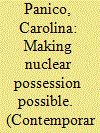

|
|
|
|
|
| Summary/Abstract |
This article interrogates the disarmament principle under Article VI of the NPT, drawing attention to how the disarmament discourse shapes and reproduces the nuclear status quo. Building on the work of Kimberly Hutchings and Maja Zehfuss, I argue that the disarmament discourse renders nuclear possession more acceptable. It enables nuclear states to present themselves as less violent and more responsible actors glossing over the nature of possessing nuclear weapons. Using a feminist poststructuralist lens and examining empirical illustrations, the article explains how declarations of strict observance of the disarmament principle reaffirm traits and values that underpin social expectations of what is considered ethical and appropriate in nuclear politics. Moreover, it shows how the rhetorical commitment to a world free of nuclear weapons reinstitutes and preserves existing understandings around nuclear responsibility that define the bounds of acceptable nuclear possession, perpetuating the dominant status quo.
|
|
|
|
|
|
|
|
|
|
|
|
|
|
|
|
| 12 |
ID:
117838
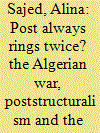

|
|
|
|
|
| Publication |
2012.
|
| Summary/Abstract |
This article makes the case for rethinking the relation between poststructuralism and postcolonialism, by building on the claims advanced by Robert Young, Azzedine Haddour and Pal Ahluwalia that the history of deconstruction coincides with the collapse of the French colonial system in Algeria, and with the violent anti-colonial struggle that ensued. I choose to examine narratives of theorists such as Derrida, Lyotard, and Cixous because not only they provide the link between colonial violence, the poststructuralist project that ensued, and postcolonialism, but also because the problems I identify with their projects are replicated by much poststructuralist work in International Relations (IR). I signal that one of the most significant consequences of conducting poststructuralist research without attention to postcolonial horizons lies in the idealisation of the marginalised, the oppressed or the native without attending to the complexity of her position, voice or agency. Bringing these theories together aims to highlight the need for a dialogue, within IR, between poststructuralism's desire to disrupt the disciplinarity of the field, and postcolonialism's potential to transcend the self-referential frame of IR by introducing perspectives, (hi)stories, and voices from elsewhere.
|
|
|
|
|
|
|
|
|
|
|
|
|
|
|
|
| 13 |
ID:
067182


|
|
|
|
|
| Publication |
Durham, Duke University Press, 2005.
|
| Description |
xii, 612p.
|
| Series |
politics, history, and sociology
|
| Standard Number |
0822333635
|
|
|
|
|
|
|
|
|
|
|
|
Copies: C:1/I:0,R:0,Q:0
Circulation
| Accession# | Call# | Current Location | Status | Policy | Location |
| 050499 | 301.09/ADA 050499 | Main | On Shelf | General | |
|
|
|
|
| 14 |
ID:
114086
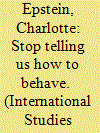

|
|
|
|
|
| Publication |
2012.
|
| Summary/Abstract |
In this paper, I use a phenomenon of resistance to a global norm as a catalyst to critically re-examine the cognitive frames underpinning the use of the concept of socialization in international relations. My critique, which adds to the now growing critique of constructivism's neglect of the role of power in the international system, is threefold. First, socialization tends to be apprehended as a bettering of the socializee, because of an implicit teleological assumption of change as progress. Second, the concept tends to frame out the perspective of the socializee. Third and relatedly, it infantilizes the socializee. I use the international politics of whaling to illustrate the practical and conceptual effects of this infantilization of the socializee and specifically the ways it curtails both policymaking and scholarly research. The purpose of my efforts here are not to discount the usefulness of "socialization" in understanding norm dynamics but to caution against these three particular forms of silencing effected by the epistemological apparatus that has taken shape around it.
|
|
|
|
|
|
|
|
|
|
|
|
|
|
|
|
| 15 |
ID:
184048
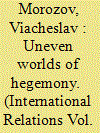

|
|
|
|
|
| Summary/Abstract |
The neo-Marxist literature on uneven and combined development has made significant progress towards a comprehensive theory of the international. Its point of departure is societal multiplicity as a fundamental condition of the international. This article identifies an important lacuna in the ontology of multiplicity: there is no discussion of what constitutes a ‘society’, or the basic entity capable of entering a relationship with other entities. Existing solutions, including those relying on relational sociology, gravitate towards ontological individualism. Building on poststructuralist neo-Gramscian theories, I propose to ground the conceptualisation of ‘society’ in the notion of hegemony. This implies a discursive ontology, which attributes the inside/outside dynamic to hegemonic formations rather than states or societies. Coupled with the understanding of hegemony as a scalar phenomenon, this ontology can account for the primacy of the state in modern times, while also enabling a research focus on other types of collectivities.
|
|
|
|
|
|
|
|
|
|
|
|
|
|
|
|
|
|
|
|
|